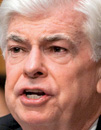The Senate Banking Committee's plan to overhaul Wall Street has received a cool reception in the brokerage world.
The Senate draft, unveiled last week, eliminates the “broker-dealer exemption” from the adviser registration provisions under the Investment Advisers Act of 1940, effectively requiring brokers providing advice to register as advisers and be subject to a fiduciary standard. That standard would be the same applied to advisers and would require them to put the client's interests first.
In the way it approaches the key issue of advice standards, the 1,136-page draft legislation released by Senate Banking Committee Chairman Christopher Dodd, D-Conn., and other Democrats on the committee differs in key respects from the proposed Investor Protection Act, approved Oct. 28 by the House Financial Services Committee, and the White House-backed plan issued in July.
The House bill also would require all brokers providing advice to abide by fiduciary standards but would give the Securities and Exchange Commission the discretion to write regulations defining those standards. Advisers have argued that an SEC revision of fiduciary standards could result in rules closer to those under which brokers work, which require only that products be suitable to the investor.
The Obama administration's plan would require brokers to come under a fiduciary standard.
The Securities Industry and Financial Markets Association supports the House and administration plans, while adviser and consumer groups support the Senate approach.
“While it works well for investment advisers, it doesn't work for brokers,” Ken Bentsen, SIFMA's executive vice president, public policy and advocacy, said of the Senate draft. “It applies to a different type of business model.”
SIFMA has called for allowing the SEC to write a uniform fiduciary standard for advisers and brokers who give advice. “It's not that brokers should get some sort of fiduciary-lite,” Mr. Bentsen said. “There needs to be an equal standard in terms of care that's applicable to the broker business model.
However, while SIFMA favors the uniform fiduciary provision in the Investor Protection Act, it opposes another part of the bill that could bring much of the investment advisory business under the regulation of the Financial Industry Regulatory Authority Inc.
“We have concerns about it,” Mr. Bentsen said. “It's created some confusion. The way it's written, it could extend to fund companies.”
The Financial Services Institute Inc. has not had a chance to review the Senate draft and thus declined to comment, FSI president and chief executive Dale Brown said.
The Senate draft “is a better approach than what came out of the House,” said Nancy Hradsky, special-projects manager for the National Association of Personal Financial Advisors. Ms. Hradsky is NAPFA's representative in the Financial Planning Coalition, which is pushing for creating a regulatory body to oversee financial planning. “It is extending the fiduciary standard,” she said.
The Senate plan “is the best and simplest approach,” said Dan Barry, director of government relations for the Financial Planning Association.
“It makes it clear that the standard that applies to advisers and brokers is the same exact standard,” he said.
A major stumbling block in bringing broker-dealers under adviser regulation has been the restrictions in the Investment Advisers Act against principal trades, which involve the purchase and sale of securities from a brokerage firm's inventory. Such trades, which are common in the brokerage business, could pose a conflict of interest for advisers whose employers act as principals in securities transactions.
The Senate draft would allow the SEC to write regulations allowing brokers providing advice to engage in principal trades, as long as the trades were in the consumer's best interests and the adviser avoided conflicts of interest.
That could result in expanding principal trades to traditional investment advisory firms as well, said Richard Marshall, a partner with Ropes & Gray LLP. “It wouldn't make any sense to permit you to trade on a principal basis if you work for a full-service broker-dealer, but not permit it if you don't,” he said. Many investment advisory firms are affiliated with broker-dealers.
While advisers are concerned about the House plan to give the SEC the authority to write rules governing fiduciary standards, brokers may be concerned about allowing the SEC to write rules regarding principal trades. “That will raise concerns with the brokerage firms as to when will the rules come out. And when they do come out, what are they doing to say?” said Thomas Gorman, a partner with Porter Wright Morris & Arthur LLP.
The Senate draft “doesn't resolve the issue of when the individual is acting as a broker and when they are acting as an adviser,” said Joan Boros, a partner with Jorden Burt Boros Cicchetti Berenson & Johnson LLP.
That issue, she said, “has always been the thing people have scratched their heads about.” An adviser with a brokerage firm may be acting as an adviser when giving clients advice on investments. But when the plan is implemented, questions will arise about how advisers working for brokerage firms could meet fiduciary duties if they sell products to clients, she said.
Mr. Frank has said he expects to bring a consolidated package of financial service reform legislation, including the proposed Investor Protection Act, to the House floor in early December. Mr. Dodd hopes to mark up his financial service reform bill in early December as well.
E-mail Sara Hansard at [email protected].







